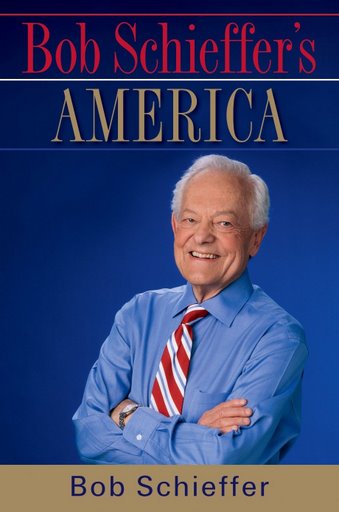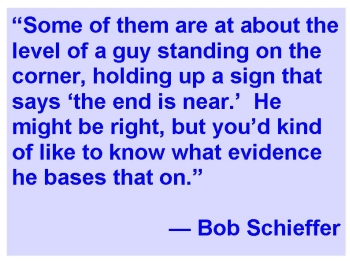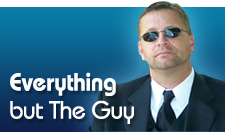“We’ve talked about 20 minutes, so I think you have enough,” he said, abruptly ending a great conversation in a phone interview last week. But CBS News icon Bob Schieffer had been gracious to grant an interview just a couple of weeks after he moderated the final presidential debate between John McCain and Barack Obama, and after all, he gave me equal time considering what was awarded the next president of the United States (in front of a national audience). No complaints.
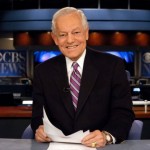
Bob Schieffer, CBS photo
Lesson 1: Ask the more self-serving questions first. Instead, I opted to swing back and forth between the new book Bob Schieffer’s America, the presidential debate and this new “journalism” of Web 2.0 … rather than my favorite – wireless connectivity. Schieffer has been on a whistlestop tour of his own promoting his book – shrewdly — preceding his starring role in the debate, which has received acclaim as the most engaging of the three debates.
Lesson 2: Be in the right place at the right time. As I blogged in my local Starbucks, Schieffer was signing books next door at Barnes & Noble (prior to the debate). So, I ponied up, bought his book with what was almost my last twenty dollars (literally) and stood in line to ask him for the interview. Perhaps the best 20-dollar bet I ever placed. And speaking of right place/time, of course it’s well known that Schieffer’s career skyrocketed in the 1960s after he became an integral part of the JFK assassination coverage, landing an exclusive interview with Lee Harvey Oswald’s mother.
Lesson 3: On the Internet, content may be king, but substance is not an absolute. Our discussion naturally centered on the debate. As a reference point, I pointed out that President Jimmy Carter was “defeated” in a TV debate overwhelmingly by the man who would be known as “The Great Communicator” – President Ronald Reagan. Many recall Carter landed points with facts, figures and logic only to be outperformed in the minds of a television audience with catch phrases, most notably “There you go again.”
Quick side note: Governor Sarah Palin paid homage to “There you go again” in her debate and guess what, the next day commentators were comparing her to Ronald Reagan.
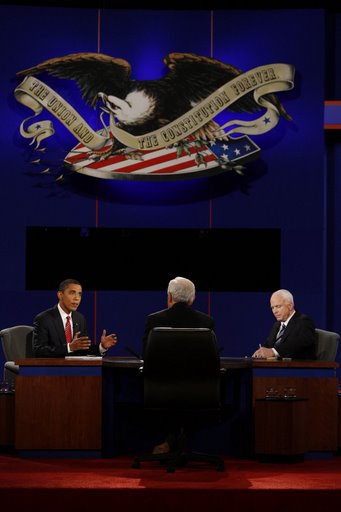
Back To The Debate, CBS photo
Will the next president be known as “The Great Twitterer?”
So, Mr. Schieffer, let’s talk substance … or content in the new vernacular.
“Debates are not always won on substance,” Schieffer said. “And the reason for that is that the vote for president is different than any other vote we cast. When you vote for city councilman, most of the time it is because of the position he has taken on an ordinance. ‘Do we keep the liquor stores open on Sunday? Do we allow any warehouses in the neighborhood? Should they be zoned for that?’ … When people vote for president they vote for the person they would feel most comfortable with in a time of crisis. Reagan seemed cool and composed in that debate – he may not have won on substance – but I think he won on composure and that does count for a lot in presidential politics.
“I think he (Obama) is very good at remaining composed. I think if anyone is going to rattle him, that is going to be a very difficult job. I think that’s where he has been seen in these instant polls as the winner of the debates … I would say most of that was because of his demeanor rather than the particular substance of what he said.” Schieffer rated the candidates even on substance, during his debate.
So, if the TV cameras and their audience bow to appearances – don’t forget historians say Kennedy defeated Nixon because he looked better under the scrutiny of the TV camera in a prime time debate – who will sort through this and inform the American people? Will it be traditional journalists? Will it be the blogosphere elite?
“So much of what we’re seeing on the Internet now is more venting than it is even opinion’” he said. “Sometimes people just get up in the middle of the night and they have a thought and they put it on their blog and that’s great. But I prefer commentary that is sort of based on fact. Or when people say ‘this is what I have come to believe and here’s why’ – rather than ‘this is my opinion.’”
In his book, Bob Schieffer’s America, he breaks down the role of journalism as elucidate, rather than advocate. (I think another verb in the list could be pontificate … put the three together and you have the foundation for a pretty deep rap song … I digress.)
“There are some very good Web sites out there. I think CBS has a very good Web site, and some of them follow journalistic standards. But … some of them are at about the level of a guy standing on the corner, holding up a sign that says ‘the end is near.’ He might be right, but you’d kind of like to know what evidence he bases that on,” he quipped.
(SIDEBAR: On this topic, I watched an interview on YouTube the other day posing questions to Craig Newmark, the founder of Craig’s List – one of the most successful entrepreneurs and generous philanthropists in the history of the Internet. He is a super nice guy, and no doubt a visionary. The “journalist” asked Newmark to describe what each candidacy has done successfully on the Internet. The expert described one campaign and the piece ended, with no attempt at unbiased reporting …)
Have the rules of journalism changed (back to “elucidate vs. advocate”)?
“That’s just kind of the rule that I try to follow. I’ve never been one who thought the primary purpose of commentary was to try to convince people of something. There are some journalists that … that is fine. It’s just not what I do. I’ve always had the objective more of trying to just explain something or to cause them to think of it in a different way. The idea of my commentaries has never been to try to persuade people to my point of view but to just cause them to think about it or to give them a little smile.”
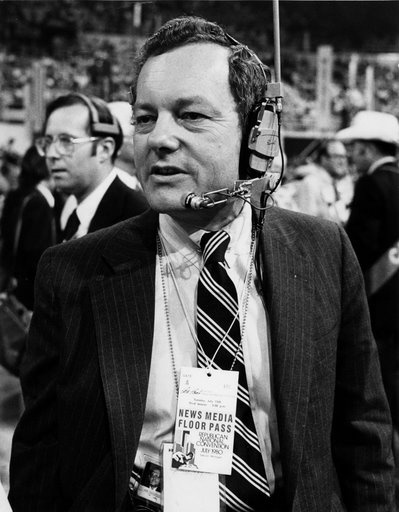
'Almost Wireless,' CBS photo
Schieffer has enlightened audiences for more than 40 years, perhaps most notably on the network’s “Face The Nation.” One source assessed that program’s viewership at 3.8 million, on average. (I am a blogger so I have not substantiated that.) But, perhaps his coup de grace, Schieffer along with the two other guys in the debate captured the attention of some 56 million viewers. He has seen it all. He has witnessed and reported the biggest events in modern history, but he didn’t “go at it alone.”
“The thing to understand on the Internet is, it is the first conveyor or deliverer of news on a national or international scale that has no editor,” he said. “Even the worst newspaper has an editor. There’s always somebody on even the worst news paper that knows where the stuff came from. On the Internet, you never know where it comes from. Most of the time it is reliable, but sometimes it is totally inaccurate and wrong. … It is ‘consumer beware.’ We have to check it out to make sure that what’s there is accurate.”
Schieffer noted that much of the criticism of vice presidential candidate Governor Sarah Palin had been circulated on the Internet.
I asked Schieffer about one of my favorite sayings, that “politics is show business for ugly people.” He laughed. But , back to business, he described what he refers to in his book as “an elite new class of professional office seekers.” Is the current race a case of “professional office seekers?”
“No. I’m not sure that I would say that. John McCain has spent a lifetime in service to his country, first in the military and now in politics,” Schieffer said. “I think Barack Obama started out working in the community. I would not call him a ‘professional office seeker.’ But the truth of the matter is that he has been in politics most of his life.”
Candidates aside, Schieffer described the cottage industry that has sprung up alongside politics: sound bites, image makers, pollsters, multi-million dollar ad campaigns. In his book he described a time when people volunteered on campaigns because they thought the candidate would best represent the people.
“… The fact of the matter is that there are a lot of people who are professionals, and if someone else had of hired them, they very well might have worked in that campaign” he said. There’s nothing immoral about them — the same way it’s not immoral for a lawyer to go to work and take someone for a client and getting paid for it. That’s what he does for a living. Now, these people are all professionals and I think that is what has changed the face of politics.”
With so many hired guns, the pollsters and the discrepancies from poll to poll … is this ethical? What about the Hillary Clinton campaign and the criticism regarding potential conflicts of interest for her chief strategist Mark Penn, political polling guru and public relations executive?
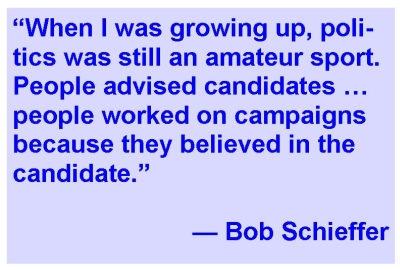
“I think it does raise questions about his credibility,” Schieffer said. “The campaign claimed that it didn’t and Hilary Clinton is welcome to hire anyone she wants to hire to work for her. But, I would guess that did raise some questions about his credibility. These are politicians hiring people who they think will help them, and when it got to the point when Hillary Clinton didn’t believe he was helping her – she got rid of him. It’s just about as simple as that.
“When I was growing up, politics was still an amateur sport. People advised candidates … people worked on campaigns because they believed in the candidate.”
One would have to blog from under a rock to miss the fact that this presidential campaign is characterized by volunteer armies … on both sides of the fence. And consider the dollars raised and spent on marketing, while issues like funding healthcare hang in the balance!
“I think it’s a good thing. I think in this case, these are not ‘fat cats’ that are pouring in hundreds of thousands of dollars,” Schieiffer said. “In the last campaign you actually had people who gave as much as a million dollars. But this time, Obama raising 150 million dollars in one month — an absolutely staggering figure. I guess John Kerry raised 300 million dollars during his entire campaign, and everybody thought that was a lot. And here someone raises 150 million in one month, that’s just almost phenomenal. I’ve never heard of anything like that. That’s twice as much as the previous monthly record, which was set the month before by Obama when he raised 66 million.”
I pointed out that Schieffer, in his book, also compared political ads to the high art of professional wrestling. Methinks Mr. Schieffer is too hard on wrestling! Kidding aside … things have gotten so bitter … in the blogosphere, in TV ads … in politics in general. “Can’t we all just get along?”
“We have gotten to the point now where it is virtually impossible for The Congress to get anything done,” he said. “… They kind of nibble around on the edges, but they are unable to confront major issues head on. I think part of that is because of this very bitter partisan nature, and the very bitter atmosphere that has now engulfed Washington. It will always be partisan – it is supposed to be. But it seems to me it has gotten a little meaner than it should be, and maybe once we get past this campaign … well, we’ll see what happens. I hope it gets better. It has to.”
So really Bob … may I call you Bob? Just between us — a couple of guys from Fort Worth … who really won the debate? I mean, my crowd all saw it one way … overwhelmingly. And no surprise, the folks on the other side of the fence all saw it one way. Were the two candidates “preaching to their respective choirs?”
“I think what they do (debates) … they galvanize sometimes more than they persuade,” he said. “I think they do have a real impact, but when you do these polls and you ask people who won, a lot of times they say who they want to win. And they’re honest … they’re not being dishonest … but because they are ‘for someone,’ they sometimes think they (their candidate) did better. So I think where a person stands in the polls usually has a great deal to do with who the winner of the debate is.”
Ha … now I’m confused … was that a Catch 22?
As I mentioned above, Mr. Schieffer and I ran out of time. Rather than joke that “this is a blog, we don’t have to take a commercial break,” I thanked him profusely. I never had the chance to ask him the obligatory “do you open your laptop and blog at Starbucks?.” I’ll bet Schieffer (and it is just my hunch) is comfortable on the computer keyboard, and probably has fired off a text message in his time, even though in his book he says “cell phones are today’s cigarettes” – a fixation for people to pass time when there is a lull.
But I choose to see a mental vision of him banging out content on one of those really cool, vintage black, manual typewriters – the ones that have a bell that rings when you reach the end of a line as you click along … the ones that rock the entire desk when you slam back the carriage return …
The newsman has seen so much in his career … and more to discuss. There will be another post later in the week, in which Schieffer and I discuss Nixon, China, 9-11, Iraq and George W. Bush, the former business partner of the journalist’s brother … who by the way, is commonly known as “Tom,” if I am not mistaken.
Lastly, here is what TIME had to say, just prior to the Schieffer’s attempt to pin down content with the candidates:
http://www.time.com/time/nation/article/0,8599,1850410,00.html
